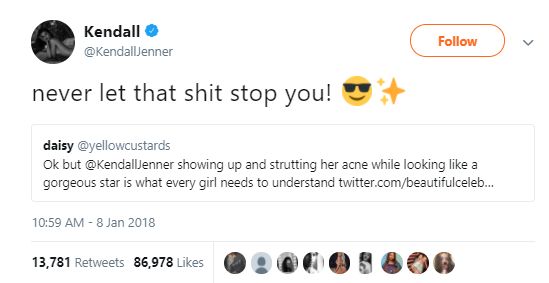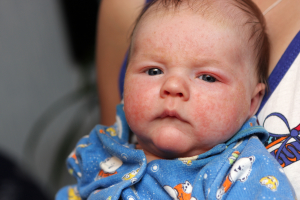A new study shows that ACA tobacco rating rules aren’t enforced in employer plans.
Managed Healthcare Executive – Health Management



Tag Archives: Helping
The celebrities who are helping to fight the acne stigma
When we think of celebrities, we think of perfection. Flowing, shiny hair, slender figures, and blemish-free, radiant complexions. Or so we think.
But in reality, famous people are just like us. While they may have the luxury of professional makeup artists and skilled photo editors, they are still human. That means many have struggles just like the rest of us – including acne or other skin problems.
As we’re surrounded by a constant influx of edited and perfectly-curated social media posts and advertising, it’s vital to remind ourselves that sometimes, even the most flawless or privileged celebrities suffer with monthly hormonal breakouts or in some cases, cystic acne.
Thankfully, some of the nation’s most loved celebrities have begun opening up about their skin struggles. And I’ve got the utmost respect for every one of them. They’re helping to normalize a skin issue which was previously stigmatized, and more importantly, they’re comforting thousands of young people – their fans – who are struggling with their skin and self-esteem on a daily basis.
So let’s take a look at some of the celebrities who have opened up about their struggles with acne:
Georgia Toffolo
Made in Chelsea star ‘Toff’, has spoken honestly about her struggle with skin since taking the crown on ITV show ‘I’m A Celebrity.’ She described how her lowest point with her skin was the night before she was due to enter the jungle. Looking at her skin in the mirror, she cried. She couldn’t bear to be seen on national TV without makeup.
Thankfully, she was allowed to take in her foundation. But since leaving the ITV show, she’s been inspired to open up about her struggles, and recently appeared on This Morning chatting about her experience with acne.
She explained: ‘When I don’t have my foundation on, I’m a very different person. I notice even when I’m with my friends and family, if I don’t have my makeup on I can be quite irritable. I don’t feel confident in myself but when I do have make-up on, I feel confident.’
It just goes to show that we shouldn’t believe all the images we see on social media or television. I’d have never guessed that Toff had acne whilst watching her on Made In Chelsea. I suppose that the jungle made Toff realize she was hiding behind a mask, in a way. In that setting, she had nowhere to hide, which has inspired her to tackle her issues head-on rather than depending on makeup.
Showing insecurities and opening up about vulnerabilities takes huge guts, and Toff probably doesn’t realize the difference her honesty will make. She’s a gorgeous, beautiful and bubbly young woman. I’m sure that many of the young girls who look up to her will feel a great sense of comfort to know that their idol struggles with her skin too… and that she’s still absolutely beautiful regardless!
Joe Sugg
Joe Sugg, also known as ‘ThatcherJoe’, is a popular British YouTube star with over 8 million subscribers.
He’s recently released a video where he frankly discusses his acne struggles over the years. He mentioned how he tried numerous methods to sort out his skin, and eventually resorted to asking his sister to help him cover his skin with makeup.
It’s easy for us to assume that YouTubers are absolutely perfect. They tend to only show the best moments of their lives on camera, which can make us feel that they have a perfect life with no problems whatsoever.
Yet even Joe Sugg, one of the most influential social media stars of our generation, has suffered terribly with acne, eventually leading to low self-esteem.
There’s much less support out there for boys with acne. Acne in boys just doesn’t seem to be discussed as openly, or as often. Joe Sugg is such an influential and ‘cool’ young guy, that his honesty will undoubtedly help other boys suffering in silence with their skin to come out and seek help. Ultimately, his video will help thousands of boys, who are feeling down about their skin, know they’re not alone.
Kendall Jenner
When we think of Kendall Jenner, acne is the furthest thing from our mind. She’s a supermodel and part of the illustrious Kardashian family. Surely, acne couldn’t affect her… right?
Wrong. Kendall recently opened up to her fans, stating in a letter: “I had such bad acne when I was younger. It completely ruined my self-esteem – I wouldn’t even look at people when I talked to them. I felt like such an outcast; when I spoke, it was with my hand covering my face.”
She was recently ridiculed by trolls for having acne whilst attending the 75th annual Golden Globe Awards in LA. She hit back on Twitter, replying to a fan who applauded her for having the confidence to slay the red carpet despite her troubled skin. Kendall replied, “Never let that s**t stop you!”.
If more and more celebrities are opening up about struggling with their skin, even Kendall Jenner, who has modeled for the likes of Calvin Klein… what does it show?
It’s simple. It shows us that absolutely no one is perfect. And that’s completely okay.
Do e-cigarettes work at helping you kick the habit?
In the UK, smoking is the primary cause of preventable illness and premature death, accounting for around 96,000 deaths a year. This figure is more than those for obesity, alcohol, road traffic accidents, illegal drugs and HIV infection combined. The financial cost of smoking is also steep, and not just for the smoker. Annually, a 20-a-day smoker spends around £3000 on cigarettes. The ever-overburdened NHS spends approximately £2 billion treating smoking related diseases, whilst businesses spend around £5.8 billion on smoking breaks. Astronomical costs all round.
Quick and easy ways to quit smoking are therefore highly sought after, and currently e-cigarettes are ranking top of the list. There is, however, some debate into the health benefits of switching to e-cigarettes in the long-term, simply due to the relatively short time they have been on the market. The short term benefits, though, are undeniable.

E-cigarettes provide that nicotine hit without any of the nasties produced by tobacco, such as tar and carbon monoxide. They work by heating a liquid in the cigarette that creates a vapour which is then smoked by the user. Different strengths of nicotine are available, ranging from 0-24mg, to help you gradually reduce your intake and, consequently, your cravings. Dramatically reducing it usually results in relapses and is unsustainable, hence the popularity of this more tailor-made form of nicotine replacement therapy. You can also get a variety of liquid flavours to add some excitement and intrigue to the process, whilst also eliminating the smell of tobacco smoke.
There are many who voice uncertainty over the health effects of smoking this chemical liquid. Smoking e-cigarettes, or ‘vaping’, is a relatively new concept, so obviously the long-term effects of it are still unknown. However, Public Health England has said the current expert estimate is that e-cigarettes are 95% safer than tobacco cigarettes. Whilst not risk-free, the liquid in e-cigarettes (containing nicotine, propylene glycol and/or glycerine and flavourings) are far less harmful than the 4000 chemicals in tobacco, at least 50 of which are cancer-causing. The most elementary distinction between e-cigarettes and tobacco is that the former don’t contain tar and carbon monoxide, which are the two most prominent toxins in cigarette smoke.
The most effective way of using e-cigarettes to quit smoking is to do it slowly and combined with expert support from the NHS stop smoking services, which can help you regulate and control your use of tobacco and e-cigarettes. The NHS says that “people who use e-cigarettes too little or too rarely have less success at quitting smoking”. Studies have shown that those who use e-cigarettes – and that’s around 40% of those trying to quit – are 60% more likely to quit than those who go cold turkey, i.e. without using nicotine replacement therapy. Public Health England has also said that if all smokers switched to e-cigarettes then the death-toll would be reduced to approximately 4000 a year. That’s the top experts’ best estimate at the moment. You can’t ask fairer than that.
Content supplied by Matthew Finch of Distinctly
Helping Children with Eczema Naturally
Eczema in Children and Natural Herbal Solutions
If your child has eczema chances are your child is experiencing intense itching and irritation that is driving them crazy. Often the child’s mother and/or father also experience some form of allergic reaction as well, such as asthma, eczema/dermatitis or hayfever. So the child may have a genetic factor making them intolerant or allergic to something in their environment or to something they are ingesting.
Eczema can be managed and even eradicated by making changes to diet and taking supplements. The following suggestions may help:
- Take out dairy and wheat from their diet. Both dairy and wheat are potential food allergens. Dairy can be replaced with calcium enriched rice milk, coconut milk and oat milk – or you can buy all three and mix them together. Wheat can be replaced with spelt bread or wheat free breads from the supermarket or health food stores.
- Take out artificial colours and preservatives. Become a “label detective” and buy your child more natural foods that don’t have colours and preservatives. Foods such as fruit, nuts, seeds, rice crackers, carob coated licorice etc make good healthy alternatives for snacks. Your local health food store is full of yummy alternatives.
- Increase the “good” oils. Often eczema sufferers are deficient in essential fatty acids (EFA’s). The EFA’s are the “good” oils that can be consumed from fish, nuts, seeds, avocados, coconut milk and olive oil. They can also be taken in supplement form such as fish oil supplements.
- Good gut flora. A good acidophilus supplement for kids is very important for children with eczema. In fact you can add it to their rice or oat milk and they won’t even know they’ve had it.
- Decrease red meat and sugars. Red meat and sugars are acidic to the body and are best kept to an absolute minimum. Instead increase fish and lots of vegetables into the diet, and use alternatives to sugar such as local or raw honey on rice crackers or spelt toast.
- Apply herbal creams/ointments. A number of natural herbal substances can be used for the temporary relief of eczema. Creams, ointments or plant oils containing extracts of licorice, German Chamomile, Calendula, Nettle and Lavender are effective alternatives to the cortisone-containing ointments.
Suggestion – Eczema smoothie for kids:
½ cup calcium enriched rice milk
¼ cup oat milk
¼ cup pineapple or apple juice
2 tspns of coconut milk
1 tspn olive oil
acidophilus powder (use dosage recommended on bottle)
½ banana
Just blend all the ingredients until smooth. Add ice to chill if you wish.
And serve “Drink it Freddy, Drink it”. One of these a day may keep the eczema away.
Eczema requires time to heal. So give it at least a month before you start seeing results.
The information provided in this article is a general recommendation only. Each child and adult is different and it is always best to see a health practitioner or naturopath to receive a truly wholistic approach and management specific to the individual. If there is no relief to symptoms using the general approach above after 1 month, or you have questions regarding making changes to diet, finding recipes suitable for children, or even obtaining a herbal cream right for you or your child.


